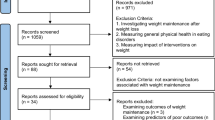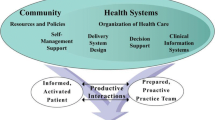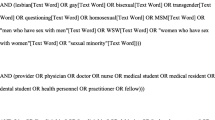Abstract
BACKGROUND
Physicians must effectively evaluate and treat obesity. To design a needs-driven curriculum intended to improve patient outcomes, physicians were surveyed about their self-perceived knowledge and skills.
OBJECTIVE
The objective of this study was to determine the expressed needs of residents and faculty regarding obesity care training across three specialties.
DESIGN
The study used a survey given to faculty and residents in General Internal Medicine, Pediatrics, and Psychiatry.
METHODS
Survey questions were generated from comprehensive nutrition curriculum and clinical recommendations, administered online, and then organized around a validated behavioral health framework—the 5As (assess, advise, agree, assist, arrange). Analyses were conducted to evaluate differences in perceived knowledge and skills between specialties and across training levels.
RESULTS
From an overall response rate of 65% (65 residents and 250 faculty members), nearly 20% reported inadequate competency in every item with 48% of respondents reporting an inability to adequately counsel patients about common treatment options. Internists reported the lowest competency in arranging referrals and follow-up. Psychiatrists reported the lowest competency in assessment skills.
CONCLUSIONS
This survey demonstrated a critical need for training in specific areas of obesity care. The proposed curriculum targets these areas taking into consideration observed differences across specialties.
Similar content being viewed by others
References
U.S. Preventive Services Task Force. Screening for obesity in adults: Recommendations and rationale. See comment. Ann Intern Med. 2003;139(11):930–2. (Dec 2).
Klein S, Sheard NF, Pi-Sunyer X, et al. Weight management through lifestyle modification for the prevention and management of type 2 diabetes: Rationale and strategies. A statement of the American Diabetes Association the North American Association for the Study of Obesity and the American Society for Clinical Nutrition. Am J Clin Nutr. 2004;80(22):57–63. (Aug).
Barlow SE, Dietz WH. Obesity evaluation and treatment: Expert committee recommendations. The Maternal and Child Health Bureau, Health Resources and Services. Administration and the Department of Health and Human Services. Pediatrics. 1998;10(23):E29. (Sep).
Scott JG, Cohen D, DiCicco-Bloom B, et al. Speaking of weight: How patients and primary care clinicians initiate weight loss counseling. Prev Med. 2004;38(6):819–27. (Jun).
Huang J, Yu H, Marin E, Brock S, Carden D, Davis T. Physicians’ weight loss counseling in two public hospital primary care clinics. Acad Med. 2004;79(2):156–61. (Feb).
Block JP, DeSalvo KB, Fisher WP. Are physicians equipped to address the obesity epidemic? Knowledge and attitudes of internal medicine residents. Prev Med. 2003;36(6):669–75. (Jun).
Kushner RF. Barriers to providing nutrition counseling by physicians: A survey of primary care practitioners comment. Prev Med. 1995;24(6):546–52. (Nov).
Forman-Hoffman V, Little A, Wahls T. Barriers to obesity management: A pilot study of primary care clinicians. BMC Fam Pract. 2006;7:35.
Whitlock EP, Orleans CT, Pender N, Allan J. Evaluating primary care behavioral counseling interventions: An evidence-based approach. Am J Prev Med. 2002/5;22(4):267–84.
Unrod M, Smith M, Spring B, DePue J, Redd W, Winkel G. Randomized controlled trial of a computer-based, tailored intervention to increase smoking cessation counseling by primary care physicians. J Gen Intern Med. 2007;22(4):478–84. (Apr).
The Tobacco Use and Dependence Clinical Practice Guideline Panel, Staff, and Consortium Representatives. A clinical practice guideline for treating tobacco use and dependence: A US Public Health Service report.. The tobacco use and dependence clinical practice guideline panel, staff, and consortium representatives. JAMA. 2000;283(24):3244–54. (Jun 28).
Ockene IS, Hebert J, Ockene JK, et al. Effect of physician-delivered nutrition counseling training and an office-support program on saturated fat intake, weight, and serum lipid measurements in a hyperlipidemic population: Worcester area trial for counseling in hyperlipidemia (WATCH). Arch Intern Med. 1999;159(7):725–31. (Apr 12).
Serdula MK, Khan LK, Dietz WH. Weight loss counseling revisited. JAMA. 2003;289(14):1747–50. (Apr 9).
Group on Nutrition, Society of Teachers of Family Medicine, editor. Physician’s curriculum in primary care. 2001; Updated 2005.
Sadovsky R. Management of obesity: An official recommendation. Am Fam Phys. 2003;67(2):379.
National Heart, Lung, and Blood Institute Obesity Education Initiative, editor. Expert Panel on the Identification, Evaluation, and Treatment of Overweight and Obesity in Adults. Clinical guidelines on the identification, evaluation, and treatment of overweight and obesity in adults: Evidence report. Bethesda, MD: NIH Publication No. 98-4083; 1998.
Yedidia MJ, Gillespie CC, Moore GT. Specific clinical competencies for managing care: Views of residency directors and managed care medical directors. JAMA. 2000;284(9):1093–8. (Sep 6).
Goff SL, Holmboe ES, Curry L. Barriers to obesity training for pediatric residents: A qualitative exploration of residency director perspectives. Teach Learn Med. 2006;18(4):348–55.
Rubak S, Sandbaek A, Lauritzen T, Borch-Johnsen K, Christensen B. An education and training course in motivational interviewing influence: GPs’ professional behaviour—ADDITION Denmark. Br J Gen Pract. 2006;56(527):429–36. (Jun).
John U, Meyer C, Rumpf HJ, Hapke U. Relationships of psychiatric disorders with overweight and obesity in an adult general population. Obes Res. 2005;13(1):101–9. (Jan).
Davis DA, Mazmanian PE, Fordis M, Van Harrison, Thorpe KE, Perrier L. Accuracy of physician self-assessment compared with observed measures of competence: A systematic review [see comment]. JAMA. 2006;296(9):1094–102. (Sep 6).
Ruser CB, Sanders L, Brescia G, et al. Identification and management of overweight and obesity by internal medicine residents. J Gen Intern Med. 2005;20(12):1139–41. (Dec).
Eaton CB, Goodwin MA, Stange KC. Direct observation of nutrition counseling in community family practice. Am J Prev Med. 2002;23(3):174–9. (Oct).
Glasgow RE, Emont S, Miller DC. Assessing delivery of the five ‘As’ for patient-centered counseling. Health Promot Int. 2006;21(3):245–55. (Sep).
Acknowledgment
We would like to thank the Health Resources and Services Administration (HRSA), Academic Administrative Units in Primary Care for funding this project. We would also like to thank Scott Sherman and Mack Lipkin for their help with this manuscript.
Grant Funding: 12-191-1077 Health Resources and Services Administration (HRSA), Academic Administrative Units in Primary Care, 11/05–11/08.
Conflict of Interest
None disclosed.
Author information
Authors and Affiliations
Corresponding author
Rights and permissions
About this article
Cite this article
Jay, M., Gillespie, C., Ark, T. et al. Do Internists, Pediatricians, and Psychiatrists Feel Competent in Obesity Care?. J GEN INTERN MED 23, 1066–1070 (2008). https://doi.org/10.1007/s11606-008-0519-y
Published:
Issue Date:
DOI: https://doi.org/10.1007/s11606-008-0519-y




